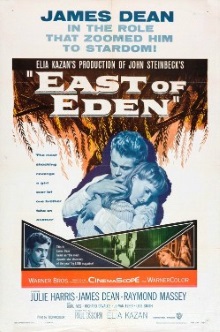
Given his huge stature as a cultural icon, it’s a little hard to believe that James Dean only ever starred in three feature films. This one was his debut, a major project directed by Elia Kazan and partially based on a novel by John Steinbeck. It’s very obviously an adaptation of the Biblical story of Cain and Abel but as my wife notes, it’s also a story with strong Freudian overtones.
Cal is one of two sons to Adam, a devout and strongly moral rancher in California. The two brothers grew up being taught that their mother died long ago but Cal discovers that their mother is not only alive and well in a neighboring town but is running a brothel. He has also long been resentful of how his father favors the other son Aron who is dutiful and obedient. He himself is irreverent and mischievous but does his best to earn his father’s love anyway in his own way. He works hard in his father’s latest venture to send lettuce preserved in ice all the way to New York. When that fails, he becomes determined to find some way to earn back the money that his father has lost. Meanwhile the First World War looms in the background even as Aron is due to marry his girlfriend Abra. Thought the two make for a good looking couple, Abra comes to fear that the good Aron has unrealistic expectations of how virtuous she is supposed to be and comes to see that Adam has treated Cal badly.
If you didn’t already know that this is an adaptation of the Cain and Abel story, you would surely realize that when Cal tells his mother his and his brother’s names and explains that they are all drawn from the Bible. This is admittedly a very clever adaptation but I dislike how heavy-handed it is and how meta it is as the characters themselves seem to realize at times that their situation is a direct parallel. Like all adaptations, bringing the familiar story into a more relatable context gives it new life and allows us to gain more insight into it. As I noted, the Freudian overtones in how Cal is continually denied his father’s approval and so craves it while being obsessed over the identity and character of his mother gives it an interesting psychological twist that wasn’t apparent in the original story. It is especially powerful then that Cal uses the identity of his mother as his ultimate weapon in his conflict with his brother and his father.
This adaptation’s most brilliant move is still that it’s main character is the Cain-analogue. It wants to explain and justify Cal’s actions and feelings and cuts him as the sympathetic figure. Conversely, it shows how petty and small-minded Adam is in his moral righteousness and how Aron’s blind obedience is built on ignorance and self-delusion. It’s a powerful subversion of the Biblical story. It does cheat a bit as Aron turning against Cal out of jealousy over Abra’s affections feels like an abrupt shift from his earlier stance of being protective of Cal. It’s also disappointing that the character goes away without having had the chance to confront his father. The film’s biggest weakness is that Cal, especially being played by James Dean, dominates and outshines everyone too much. He outshines everyone so much that it seems that everyone else is from an earlier era of filmmaking.
As brilliant as this film is, Kazan’s very traditional directing style means that it seems dated without feeling like it belongs in any particular period of American history. Dean’s performance in here is fantastic, perfectly conveying his desperate yearning for affection and his vulnerability, but everyone else is mostly ordinary. Overall it’s a product of its time and allowances must be made for that but I did find watching it to be a very worthwhile experience.